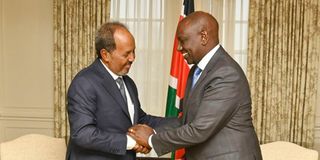EAC should do more to save Somalia from doom

President William Ruto and Somalia President Hassan Sheikh Mohamud during a meeting in Washington DC.
What you need to know:
- Unlike the older member states, each of which shares a border with more than one other, Somalia borders only Kenya.
- That means Kenya will now be both the bridge and buffer zone between Somalia and the rest of the EAC member states.
Somalia has finally been formally accepted into the East African Community (EAC) after a 10-year wait. The older EAC member states' acceptance to its request was timely and warranted because Somali nationals were already integrating and doing business in most parts of the region.
But for everyone to benefit from its magnanimity, however, the regional bloc needs to do more. First, unlike the older member states, each of which shares a border with more than one other, Somalia borders only Kenya.
That means its sole entry point to the rest of the community is through Kenya.
But that also means Kenya will now be both the bridge and buffer zone between Somalia and the rest of the EAC member states, its huge opportunities for investment notwithstanding, due to the enormous challenges in stemming the ravaging insecurity and terrorism in the Horn of Africa nation.
Somalia has a lot to offer to the rest of Eastern Africa — what with its long coastline, the longest in Africa, and abundant natural resources, which, nonetheless, cannot be exploited at the moment due to the insecurity arising from the presence of Al-Shabaab militant group in the country.
Somalia's President Hassan Sheikh Mohamud, elected in May last year, has shown his commitment to the war against the Al-Shabaab terrorists and a desire to secure and unite the country. But there is little he can do without the support of his EAC colleagues, not only in terms of winning the war militarily but also bringing the Somali people on board.
Messy political situation
The Al-Shabaab has been exploiting the disconnect between the citizenry and the government, viewed by many as being sustained by foreigners rather than Somalis, as a means to recruit the youth with specific focus on minority groups.
Three of the other seven EAC member states — Kenya, Uganda and Burundi — have been contributing peacekeeping troops and are well-versed with the situation on the ground. They have sacrificed a lot for the sake of stabilising the country.
But they have been dealing with the security aspect and hardly the messy political situation, often seen as a key contributor to the dire situation. To have an impact on Somalia, the EAC need to venture beyond security.
The vast majority of the Somali people are stuck between a rock and a hard place. Although the majority do not subscribe to the Al-Shabaab ideologies, they do not have a mechanism to take part in the country's governance system.
Since the formation of the Federal Government of Somalia in 2004, in Kenya, clan elders have single-handedly run the show. They play a key role in determining who is picked as an MP in the clan set-up and, therefore, who becomes the President (since MPs elect the president).
Clan-based warlords
This has created a clan-based, elders-led, foreign-protected political system that gives little or no room to the youth and women, who are regarded as the majority of the population, to participate in national governance.
While this system served as the only available solution in 2004, when most of the country was controlled by clan-based warlords, the situation is completely different. This as we edge closer to the end of the second decade since the formation of the federal government, hence the need to be a reboot.
To resolve Somalia’s governance problem, the region need not look any further. We have a good example in Puntland, one of the five regional states recognised as member states of the Federal Government of Somalia.
Puntland is the only regional state that does not rely on the African Union peacekeeping forces to secure its territory. It is also the only one that has organised one-person-one-vote local council elections since 1969. It is now preparing to conduct popular elections for local MPs and the regional president and his deputy in the next few months, despite challenges.
The EAC needs to partner with such successful regional states with the aim of using them a launchpad to spreading good governance in the whole of Somalia.
Although the bloc has taken a courageous step in admitting Somalia to its fold, it has to do more for the membership to bring benefits to the country and the other member states. It needs to move with speed to correct Somalia’s mess before it spreads to the other parts of the region.
Mr Sheikh, a media and communication expert, PhD candidate and director of Brightview International, is a member of board of directors at Amnesty International and former Head of BBC Somali Service.





